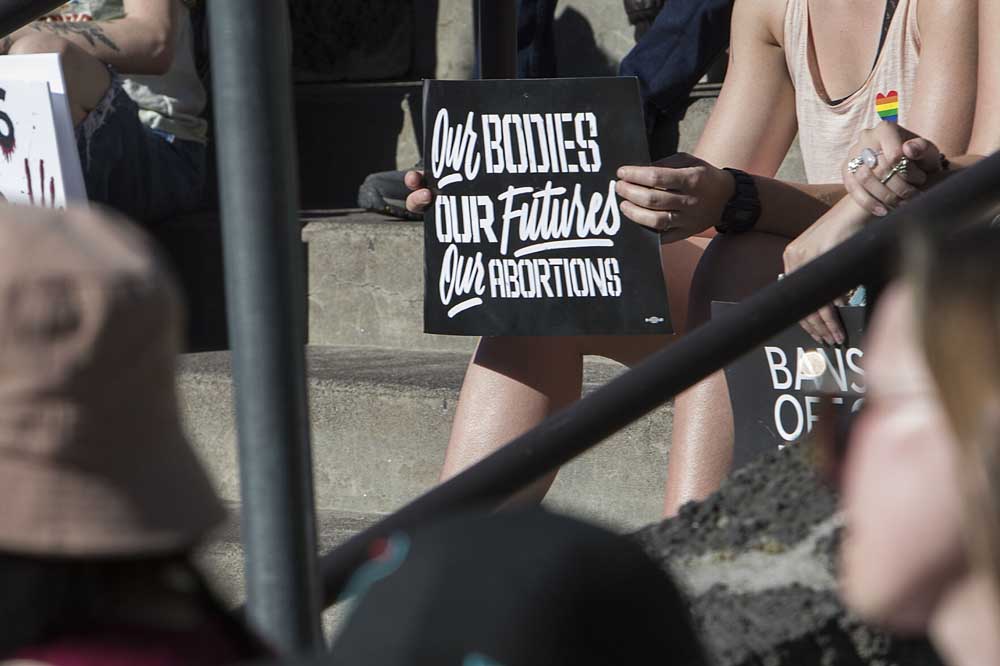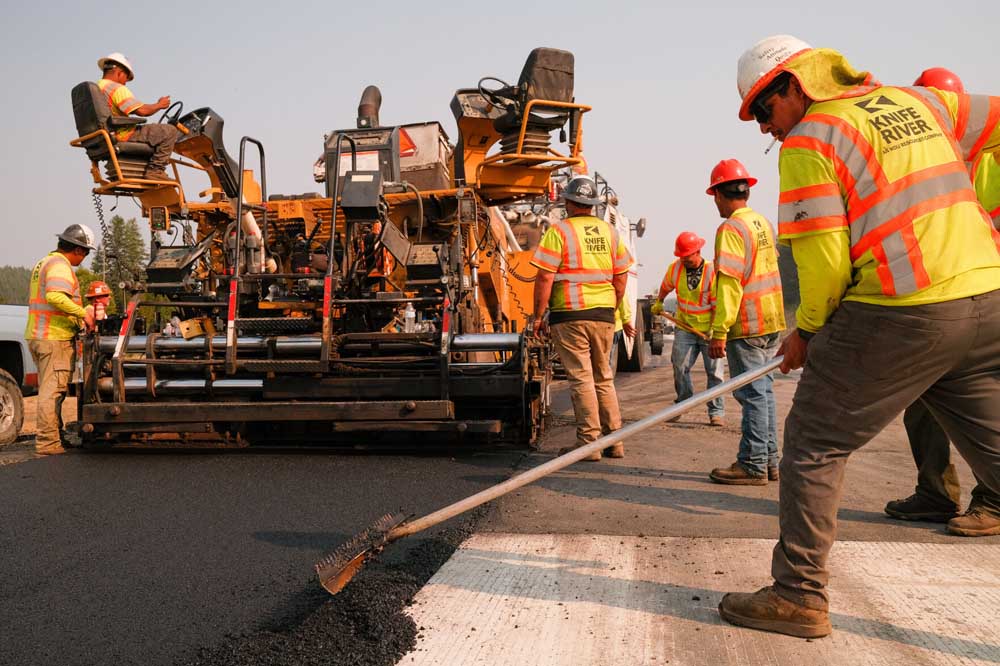Ruling means more patients may come to Bend seeking abortions
Published 6:30 pm Friday, June 24, 2022

- An abortion-rights supporter holds a sign Friday outside the Deschutes County Courthouse in Bend while protesting the U.S. Supreme Court's overturning of Roe v. Wade.
BEND — The Bend Planned Parenthood health clinic is ramping up for an influx of patients seeking reproductive health services, including abortion, now that the U.S. Supreme Court has struck down nearly half a century of abortion protections established by Roe v. Wade.
The health center in Bend is among 10 clinics performing abortions in Oregon — a state that ensures abortion access to everyone, despite the high court’s ruling Friday. It is also the only clinic east of the Cascades. Planned Parenthood is in the process of building a new clinic in Ontario, on the Idaho border, but no opening date has been set.
“We’re fully staffed in Bend and we anticipate we will begin to see more patients, and I’m very confident in the staff to meet the need,” said Anne Udall, Planned Parenthood Columbia Willamette.
The Planned Parenthood office could see twice as many patients, in part because of laws in nearby Idaho that trigger an immediate end to abortions there 30 days after the high court’s ruling, according to a study by The Guttmacher Institute.
Bend Mayor Gena Goodman-Campbell welcomed anyone coming from out of state seeking abortion services.
“My heart goes out to all of the women who are terrified about losing access to critical health care services,” said Goodman-Campbell. “The city of Bend welcomes all people seeking abortion care, whatever state they call home.”
Oregon Right-to-Life, a lobbying group for pro-life policies, celebrated Friday’s court decision, but acknowledged it could mean more people will be driven to come to Bend to get an abortion.
“As bordering states continue to pass life-affirming legislation, there may be increased traffic to the nearest Planned Parenthood location – Bend,” Lois Anderson, the executive director, said in a statement. “While Planned Parenthood continues to profit off of vulnerability, Central Oregon has a strong network of pregnancy resource centers that are committed to caring for women and their babies before and after birth.”
The centers offer classes, mentorship, material support and clinical services and often provide it at no cost to those who receive it, Anderson said.
Oregon is one of four states in the United States that has laws ensuring access to an abortion.
Nationwide, 26 states are now likely to ban or severely restrict abortion, including 13 states that have “trigger” laws like the ones in Idaho, meaning the bans or severe restrictions will start almost immediately. This will result in 36 million women of reproductive age and people who can become pregnant losing their rights to an abortion and having governments force pregnancy upon them, according to the ACLU of Oregon.
Eastern Oregonians could see a 35% reduction in abortion access, forcing patients to drive hundreds of miles to providers in Bend and Portland, according to a New York Times analysis. About 70% of Planned Parenthood’s abortion services are medication-based.
“This decision effectively supports the widespread criminalization, persecution and prosecution of people with a uterus,” said Cassandra Kehoe, a Bend attorney/advocate. “The consequences of this decision impact all of us, and will disproportionately impact people of color, immigrants and our LGBTQ2s+ brothers and sisters.”
The 6-3 court ruling on Friday doesn’t affect access in Oregon because of the 2017 Reproductive Health Equity Act that guarantees abortion access to residents and nonresidents.
The abortion rate increased 7% nationwide from 2017 to 2020, but has declined in Oregon by 21% during the same time frame, according to the Oregon Health Authority.
“It’s really back to the states,” said Patti Adair, Republican Deschutes County commissioner. “Maybe that makes some people feel uncomfortable, but it’s a state issue.”
Oregon is also one of seven states that fund abortions using general funds and requires health insurers to cover the costs. Just this year, lawmakers approved $15 million to ensure access to abortion and established the Oregon Reproductive Health Equity Fund. The fund will help those without federal abortion protections and invest in solutions that will help build an equitable health care system in communities historically and currently marginalized, according to Seeding Justice, which funds social changes through philanthropy.
The Supreme Court ruling comes a day before Central Oregon’s largest LGBTQ pride event, Pride in the Park. Alex Simpson, a board member with Out Central Oregon, the nonprofit putting on the event, said even though the news was expected it still felt gut-wrenching to hear Friday morning.
“As queer people, bodily autonomy is not lost on us,” Simpson said. “I hope people can come together (at Pride in the Park) to feel the support and love that is still there that can be hard to feel when our lawmakers are controlling our bodies in ways like this.”
The high court’s ruling drew about 150 protesters Friday evening to the area around the Deschutes County Courthouse complex.
Under the shade of trees that line the lawn, protesters held signs reading, “Abortion is healthcare” and “The Bible is not a legal document,” to express their feelings of sadness and anger.
Several speakers talked of their experiences, about losing people to illegal abortions and of their fear of losing a right over their own body. One speaker urged the crowd to scream.
The Central Oregon Diversity Project called the ruling on Friday a catastrophic setback for the country, said Josie Stanfield, founder and leader of the group.
“As a nation we must acknowledge that this is only the beginning and that our sacred rights to bodily autonomy, privacy in our relationships, gay rights, interracial marriage, safe and affordable access to birth control, and more are now at risk for each of us,” Stanfield said. “The building blocks of our Constitution are tumbling down, and we cannot sit back while our government takes them and rebuilds an even more inequitable society.
“If you live in a state that allows safe access to abortion health care offer yourself as an ally to those living elsewhere. Now is the time to come together.”






